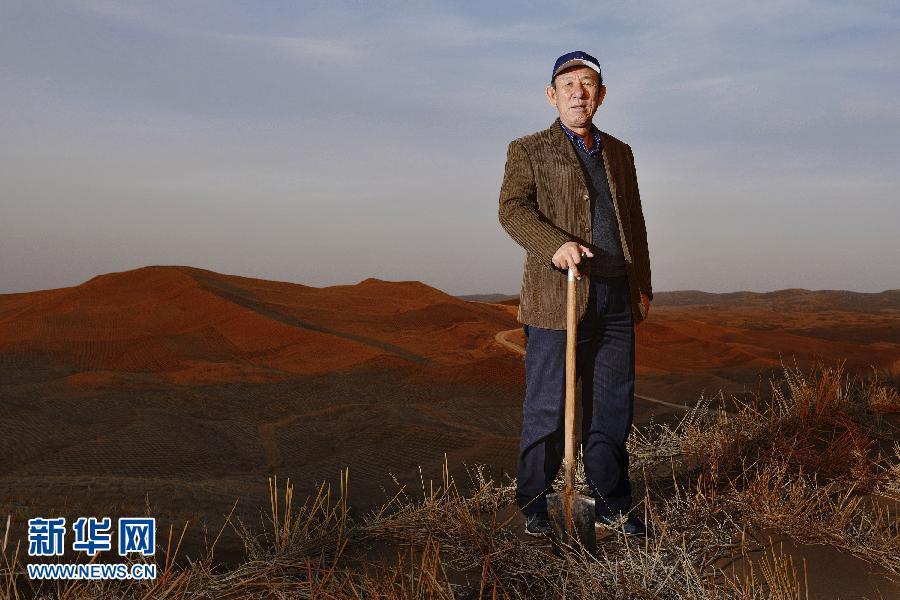'Warrior of the Sands' battles deserts
 0 Comment(s)
0 Comment(s) Print
Print E-mail China.org.cn, September 18, 2013
E-mail China.org.cn, September 18, 2013
|
|
| Wang Youde stands at the edge of the Mu Us Desert in Ningxia on Nov. 19, 2013. Known as China's "warrior of the sands", Wang Youde has been fighting the deserts in Ningxia Hui Autonomous Region since 1985. He is famous for planting 30,000 mu (about 2,010 hectares) of trees every year to prevent desertification. [Xinhua photo] |
"There are two kinds of work that one can't neglect: The work you must do and the work you like. Fortunately, combating sand is what I like and must do." --- Wang Youde
Many people do not think of China as a desert nation, but the country's deserts cover over 2.64 million square kilometers, or about 27 percent of the country. The Ningxia Hui Autonomous Region and Gansu Province are considered the dust bowls of China, as much of the land is sandy, dusty or is made of barren mountains.
Wang Youde is one of the people choosing to stay near the desert in Baijitan, Ningxia, and trying to push back the sand by planting bushes in the sands. Wang, secretary of the Baijitan committee of the Communist Party of China (CPC), is renowned for battling to curb the encroaching Mu Us Desert by planting 30,000 mu (about 2,010 hectares) of trees every year.
He won the title of national sand-combating hero in 2007 and was among the 100 most inspiring individuals selected by Central China Television's "Touching China" program in 2009.
Wang was born in 1954 into a Hui family in Ningxia. His hometown, once replete with lush grass and water, has seen its grasslands disappear as a result of overgrazing and is now afflicted by ever more powerful sandstorms.
In just one decade, more than 30,000 people from more than 20 villages were forced to leave their homes and more than 200 animal species have disappeared. Seeing the increasing devastation, Wang was inspired to take action. "I made up my mind at that time to take back the land seized by desert," he said.
In 1985, he was appointed as vice director of a forest farm in Baijitan. The farm was practically barren and the workers were almost inactive for seven months of the year. With an annual income of only several hundred yuan per year, most wanted to quit.
Faced with mounting problems, Wang changed the farm's focus and concentrating on reclaiming desertified land and his campaign has achieved noticeable success. In the first year, the farm planted 5,093 mu (about 341 hectares) of trees and yielded profits of around 90,000 yuan (US$13,891). The once empty farm was invigorated with new life and Wang worked relentlessly to tackle the ever-encroaching desert.
Thanks to his efforts, Baijitan, which was once covered by desert sands, is now a national nature reserve with a variety of plant life and stunning scenery.
Despite such notable success, Wang and his crew has suffered many setbacks in their crusade as the sand continues to reclaim some of the land where they planted trees. Despite the difficulties, Wang and his colleagues have planted 480,000 mu (3,216 hectares) of trees over the past few years, keeping almost 1 million mu (67,000 hectares) of desert under control and Wang is adamant about his mission.







Go to Forum >>0 Comment(s)